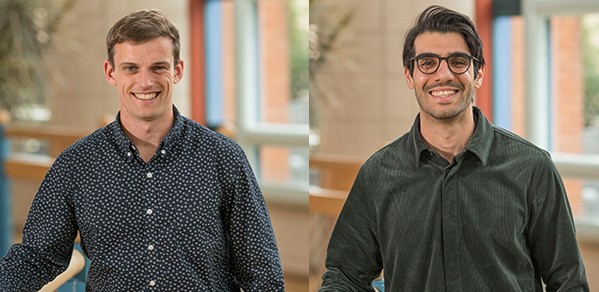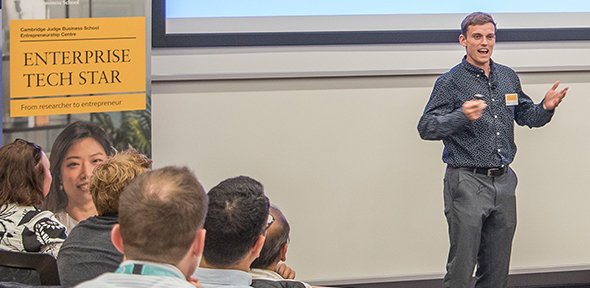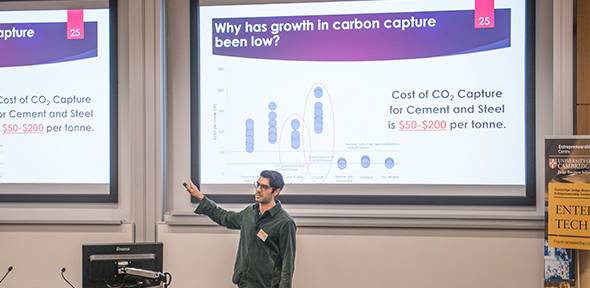
PhD student Luke Cullen and research associate Dr Mohammad Saghafifar have been flexing their entrepreneurial mindsets as part of EnterpriseTECH STAR – a programme designed to develop early-stage business ideas on the journey from scientist to entrepreneur.
The Cambridge ecosystem has been a significant catalyst in my transformation into an entrepreneur.
Dr Mohammad Saghafifar
The 10-week programme, run by the Cambridge Judge Entrepreneurship Centre, combines educational lectures and workshops with personal mentoring sessions from 40 expert mentors. The STAR students begin the programme with a business idea, and the aim is to help them take it to the next stage, whether that is via a place in an incubator or accelerator, winning a competition, or attracting pre-seed funding.
Joining this year’s cohort are Luke Cullen, PhD Student in Engineering – Artificial Intelligence for Environmental Risks, and Dr Saghafifar, Research Associate in Thermo Physical and Thermochemical Energy Storage.

PhD student Luke Cullen during his presentation. Credit: Cambridge Judge Business School.
Luke Cullen – Automating accurate carbon emissions reporting
Luke is the founder of Just Decarbonise – a platform for automating carbon emissions estimates in supply chains.
With a background in geophysics and machine learning, Luke has spent the past three years building a model to automate the estimation of greenhouse gas emissions within supply chains.
He takes a systems approach, providing immediate emissions estimates specific to a company, and iteratively reduces the uncertainty as more related data becomes available.
The model is currently trained for the petrochemical industry, and this is where Luke intends to focus his attentions first, his target market being corporate sustainability teams.
He said: “Supply chains are opaque and getting data specific to your products is challenging. Companies are spending resources on product life-cycle assessments but cannot afford to do these assessments for all products and keep them up to date.
“A company’s supply chain sits in a system of many possible product paths. I use a systemic structure to reduce the need for company-specific data and exploit the similarities of related data. This could provide a significantly cheaper option for companies.
“Decarbonisation is my priority, and it is where a systems approach can have the greatest positive impact. Successfully launched and adopted, this technology could form the bedrock for accurate and enforceable carbon footprinting, accelerating our transition to net zero, and saving lives and habitats.”
What are your next steps?
Luke said: “Thanks to the EnterpriseTECH STAR programme and the building of Just Decarbonise, my goal is to create a company that helps accelerate decarbonisation. I believe commercialisation is a route to greater impact from our exciting research innovations and I look forward to pursuing it!”

Research associate Dr Mohammad Saghafifar during his presentation. Credit: Cambridge Judge Business School.
Dr Mohammad Saghafifar – Carbon capture heat battery
Dr Saghafifar is one of the co-founders of Remedium, where he is dedicated to making carbon capture commercially viable. This initiative continues an idea that he presented at the Falling Walls Lab Cambridge in 2023, integrating the process of capturing CO2 with another value stream, electricity storage, through the development of a carbon capture heat battery.
The battery operates by storing/releasing electricity and capturing CO2 from high-emitting industries including cement and steel plants. Carbon capture heat battery monetises the variation in price of electricity to drive down the cost of CO2 capture, and in some cases, making carbon capture profitable.
Dr Saghafifar said: "Cement and steel industries emit six billion tonnes of CO2 each year, and carbon capture is the most feasible CO2 abatement pathway to decarbonise cement and steel. As of today, the global carbon capture capacity is only 43 million tons. Based on the IEA World Energy Outlook report, it has to increase to 4,400 million tons by 2040 in order to achieve net zero by 2050. The paramount impediment in large-scale implementation of carbon capture is not the technology but its cost. Capturing each tonne of CO2 costs between $70-$195 in the cement and steel industry.
"Using our technology, businesses can not only eliminate their CO2 emissions but potentially profit $10-$20 for capturing one tonne of CO2. The second aspect of our solution at Remedium is our patent-pending enhanced sorbents. Remedium’s bench-scale testing shows that its developed sorbents can capture 14 times more CO2 over its lifetime than a natural sorbent."
What are your next steps?
Dr Saghafifar said: "Thanks to EnterpriseTECH STAR and other entrepreneurship programmes that I have participated in over the past year in Cambridge, I have transformed from a purely academic individual into someone capable of building a team, raising investment, and developing the necessary strategy to take research from the lab to real-world applications. At Remedium, we are currently gathering essential information, and are further developing our business plan and strategy to initiate our seed round investment in the coming months, bringing our solution to the market.
He added: "The Cambridge ecosystem has been a significant catalyst in my transformation into an entrepreneur. This exciting journey began with my participation in the Falling Walls Lab Cambridge competition in 2023, which brought considerable attention to my work. I highly recommend the EnterpriseTECH STAR programme to anyone considering an entrepreneurial career. One of the programme's main advantages is its emphasis on personal development and the acquisition of essential skills for starting a deep-tech, science-based venture."

